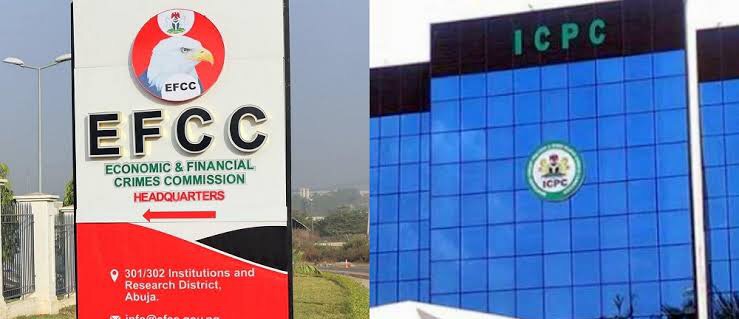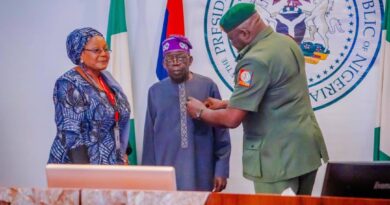Multi-billion Naira Concession Scandal Hits NIMASA; Staff Set To Petition EFCC, ICPC
Tensions that appear to have been on the rise at the Nigerian Maritime Administration and Safety Agency (NIMASA) have reached a boiling point as aggrieved staff escalate frustrations over long-lasting grievances, rooted in what employees describe as neglect, broken welfare promises, and an air of impunity among top officials.
Amidst all of this, NIMASA staff claim to have unearthed a clandestine attempt by the Director-General, Dr. Dayo Mobereola, with active connivance of the Minister of Marine and Blue Economy, Alhaji Adegboyega Oyetola, to concession the Agency to cronies for a paltry sum.
This concession scandal which allegedly tilted towards diverting Nigeria’s huge revenue from the ports into private pockets.
As it is, top management officials of NIMASA will soon be guests of the Economic and Financial Crimes Commission (EFCC) and the Independent Corrupt Practices and other offences Commission (ICPC) as aggrieved staff and stakeholders perfect petitions to the anti-graft agencies to probe alleged financial malfeasance in the agency.
At the heart of the unrest is the Director-General, whose administration is facing growing backlash for what insiders call “complete administrative disconnect.” Multiple open letters circulating within the agency outline a damning pattern of alleged mismanagement.
There have been allegations of financial misconduct levied against the DG, the director of procurement at NIMASA, and Mr. Babatunde Bombata – a Ministry of Marine and Blue Economy official for drawing bogus travel allowances exceeding hundreds of thousands of dollars and benefitting from over 20 foreign travels since the commencement of the DG’s tenure, all funded by the agency. An anonymous staff member described this unofficial alliance as a, “dangerous gang who aren’t public servants, but private profiteers operating with public money.”
However, central to the grouse of the NIMASA staff is what appears to be an under-the-radar controversial concession attempt that may compromise trillions of naira in public revenue for the next 15 years through a project called MEMS. The controversial concession has allegedly received the approval of the Infrastructure Concession Regulatory Commission (ICRC) and the Federal Ministry of Marine and Blue Economy through underhand tactics by the NIMASA DG.
A highly placed source in NIMASA’s Finance Department revealed that at the heart of the matter is a deal that would see the private developers of MEMS, Royal Diadem Consults Ltd, spend ₦7.5 billion to deploy a software system—reportedly an invoicing and billing platform akin to a standard ERP (Enterprise Resource Planning) tool. In return, the developers would receive a staggering 15% of NIMASA’s gross revenue base annually, which amounts to over ₦90 billion annually for a supposed ₦7.5 billion investment for the next 15 years.
Over the 15-year lifespan of the agreement, this would translate to trillions in public funds diverted to a private entity with no corresponding investment in critical infrastructure, operational responsibility, asset deployment, and risk-sharing. The source, who chose to remain anonymous due to fears of retaliation, further revealed that his Directorate, alongside other senior members of the Executive Management, had no input in the assessment of the proposal.
What is more shocking is that the Agency currently generates upwards of ₦600 billion annually and already spends billions on similar software systems. Thus making it harder to justify the need for a concession of this nature when the affordability of such a system by NIMASA is not in question.
This is not the first time NIMASA has been enmeshed in controversial transactions of this sort. In 2015, the Buhari administration terminated the US$103 million contract between ex-militant commander, Government Ekpemupolo aka Tompolo’s Global West Vessel Specialist Nigeria Limited and the NIMASA in 2011.
Unlike the Global West deal, which at least involved physical assets, patrols, bunkers, and enforcement capacity alongside maintenance of crew and boats, this proposal is purely centred on the provision of a software system that NIMASA can ordinarily afford. The system being proposed is essentially basic administrative software, normally procured through licensing agreements and routine service fees, not billion-naira concessions. Furthermore, the Tompolo transaction was said to have featured a clause where Global West would only be paid when NIMASA surpasses its revenue target and reaches a certain benchmark.
Additionally, a high-level source at the Operations Directorate in NIMASA mentioned that the Directorate was not involved in the review process of the transaction, hinting at the fact that diligence was not carried out in the project review process, as the Director-General of NIMASA, Dr Dayo Mobereola, must have wanted the process expedited. “We learnt that the proposal was initially designed as an Electronic System for Maritime Waste Management but was later expanded to a revenue concession in a greedy attempt by the DG, hence his decision not to involve us in the process,” the source concluded.
Proponents of the deal argue that the system will boost revenue collection by 30% over three years, simply by improving invoicing and billing procedures. However, no benchmarks, guarantees, or accountability mechanisms are embedded in the proposal. If NIMASA’s revenue remains flat or even drops, the developers still collect their 15% cut, year after year.
This lack of measurable deliverables, combined with the long-term financial commitment, effectively means NIMASA’s revenue stream is being mortgaged to private interests with no accountability to the Nigerian people.
According to a concerned staff member, “Questions must be asked. Why is a basic software solution being positioned as a national concession?
What departments participated in the review process of the proposal, and what methodologies were employed?
Why commit to a 15-year payout on a system that could and should be delivered through standard procurement channels for a fraction of the cost?
And why is there no public debate or legislative oversight on a deal of this magnitude? What type of diligence process was employed in the review of the project? How did this proposal scale the provisions of the Infrastructure Concession Regulatory Commission (ICRC) Act of 2018? What is the role of the Minister of Marine and Blue Economy in this concession?”
At a time when Nigerians are being asked to endure economic hardship, subsidy removals, and tax hikes, a deal of this nature is a slap in the face. It is the quiet privatisation of public revenue dressed up as digital transformation.
It is also worth mentioning that a group of NIMASA Staff seem bent on challenging the impunity to the full extent of the law and are all but ready to submit petitions against their Management to the Economic and Financial Crimes Commission (EFCC), demanding the investigation of the NIMASA and Ministry Leadership.
One thing is clear: NIMASA is on the edge of an institutional crisis that merges financial recklensess with administrative apathy. At its centre stands a leadership accused not just of neglecting its people, but of auctioning the future of the agency and of the nation behind closed doors.
In this instance, many are calling out Alhaji Oyetola on his roles in this apparent financial scam.
Calls to the Minister and the NIMASA DG have not been responded to as at the time of going to press.
Nigerians demand full disclosure, independent scrutiny, and a halt to any agreement that hands over the country’s maritime revenue to private profiteers under such opaque and exploitative terms.




